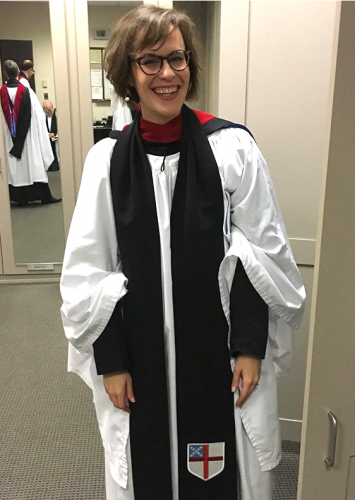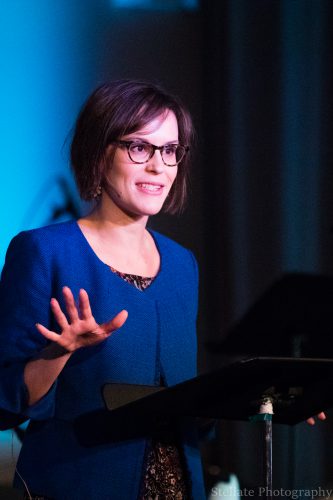
This is the second installment in a series of monthly-ish interviews between myself and various Mockingbird writers and members of the Mockingbird community. These posts will explore some aspects of each individual’s personal story and some aspects of Mockingbird’s larger story and ministry as we celebrate its 10th Anniversary. My subject this time was The Rev. Sarah Condon.

Charlotte Donlon: How has your involvement with Mockingbird impacted you over the past several years?
Sarah Condon: It’s changed the kind of priest I am. I think that’s fundamental. Had I stayed in seminary on the path I was headed, I think I would’ve quit by now because I thought it was my job to fix everyone in the pews. That doesn’t work very well for people in ministry. Mockingbird has helped me see that it’s Jesus’s job to deal with people and it’s my job to tell them about Jesus.
CD: What is it about Mockingbird’s approach to the gospel that helped you come to this realization?
SC: People are bound to their sin. People cannot escape the plight of their lives. I’m more aware now that people (including me!) are really screwed up. And Jesus is the only God who can rescue us from that.
CD: What have you learned from the Mockingbird community?
SC: I’ve learned that grace can be a fundamental part of our ministry only if it’s a fundamental part of our lives. It’s not just something that we receive from the pulpit and something that we say and it’s not a word we throw around casually. Because grace is not pretty. Grace is not a big selling point. Jacob Smith said if you want to grow a church, preach a theology of glory. If you want to shrink a church, preach a theology of the cross. On some level that’s very true because grace in the fullest extent means we are accepting our sinfulness which is not a good look, right? But that’s necessary for grace to actually be grace.
CD: I’ve seen a lot of Christians online talking about how we need to love our political enemies. How does your view of grace fit in with that?
 SC: I recently read The Captivation of the Will: Luther Vs. Erasmus on Freedom and Bondage by Gerhard Forde which looks at Martin Luther’s Bondage of the Will. A friend who’s reading it with me mentioned how we can look out in the pews and see people and be disgusted by their choices–or we can look out be merciful because we remember that they are bound by their sin, just like us. That’s my first answer. But I actually struggle with the idea that we even have political enemies, period. First, we are our own enemies. Second, if we are our own enemies, we need to recognize that everyone is in the same sinking ship. So I find it difficult to feel like I have political enemies. I am still unbelievably sad about some of the things I see in our political landscape, but we’re like those who we disagree with because of our own fallenness and sin. And that gives me a whole lot more room to offer people grace.
SC: I recently read The Captivation of the Will: Luther Vs. Erasmus on Freedom and Bondage by Gerhard Forde which looks at Martin Luther’s Bondage of the Will. A friend who’s reading it with me mentioned how we can look out in the pews and see people and be disgusted by their choices–or we can look out be merciful because we remember that they are bound by their sin, just like us. That’s my first answer. But I actually struggle with the idea that we even have political enemies, period. First, we are our own enemies. Second, if we are our own enemies, we need to recognize that everyone is in the same sinking ship. So I find it difficult to feel like I have political enemies. I am still unbelievably sad about some of the things I see in our political landscape, but we’re like those who we disagree with because of our own fallenness and sin. And that gives me a whole lot more room to offer people grace.
CD: What are some examples of high culture, low culture, and in-between culture that you’ve consumed in the past few weeks?
SC: Well, I love the show Shameless. I’m actually working on a piece for Mockingbird about it. I listen to public radio like it’s my job. I’ve had to pull back a lot from that because of the current political season because it’s so sad and hard right now. I’m off of Facebook for Lent, so I pretty much look at the weekly roundup on Mockingbird to know what’s going on. We watch a lot of Miles from Tomorrowland which is a show on Disney Junior. That’s about it.

CD: I know you love hasthags. What are some hashtags you’ve used lately?
SC: I love to use #blessedandhighlyfavored ironically. That’s one of my favorites. I’ve recently used #throwingshadeatthedevil and #ineedabeernow.
CD: What surprised you most about writing Churchy?
SC: How quickly it went! It went very quickly. There was a whole team of people helping and we got it done during one summer. Dave had me on a pretty rigorous editorial schedule and I followed it. I don’t know if that’s a terrible thing to say to another writer or not, but it just went really fast.
CD: I think it’s an awesome thing to say to another writer. It’s good to know that’s possible!
CD: What’s your favorite and least favorite feedback you’ve received about the book?
SC: I don’t have a least favorite. It’s hard for me to see any feedback as negative. Even negative feedback is great because it gives me some freedom. It’s a relief when someone says the thing I’m most worried about. Once it’s said out loud we can all move on. My favorite feedback I’ve gotten is that everyone wants to know what happened to the Jewish boyfriend.
CD: What do you want more of in the next month?

SC: I want more quiet in the next month. It’s been a very busy season with the book and I’ve done a lot of traveling and a lot of speaking. While I love that stuff in the moment, the coming back home is very brutal. I always get sick. I mean I’m going to Connecticut in a few weeks. I know that I’m going to get sick when I get home. That’s just how it goes.
CD: What do you want less of in the next month?
SC: Drama! I want less intensity. When you write a book you think that people will read it and it will be very exciting. And while that’s true, people want to process what you’ve written with you and it can be intense.
CD: I appreciate your honesty! I haven’t thought about that aspect of publishing a book. I bet it can get intense especially when you write about such personal experiences.
CD: What rituals do you do that help increase your connection to God?
SC: Every night (even though this will make me sound like such a goober), I have this lotion from Thistle Farms which is a company started by an Episcopal priest that helps women leave prostitution that I put on my hands and I sit in bed and I pray. I’ve prayed my whole life. My prayers are more honest now than they were even five years ago and I hope they will continue to be more honest the older I get. That’s the one thing that happens every day. It calms me. When I put that lotion on my hands and I think about those women and I think about how grateful I am to be in this life and think about how hard this life is for everyone, its a very grounding thing for me. I’m also a fan of the daily devotionals from She Reads Truth. It’s quite good. Also, being with my kids and my husband make me feel more connected to Jesus and the person that Jesus has called me to be.
Dear Reformation, It’s Not You, It’s Me: Theology We Love to Hate ~ Sarah Condon from Mockingbird on Vimeo.

COMMENTS
Leave a Reply












